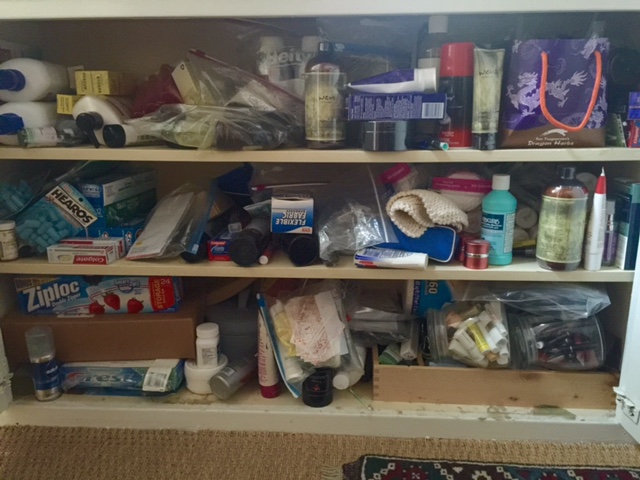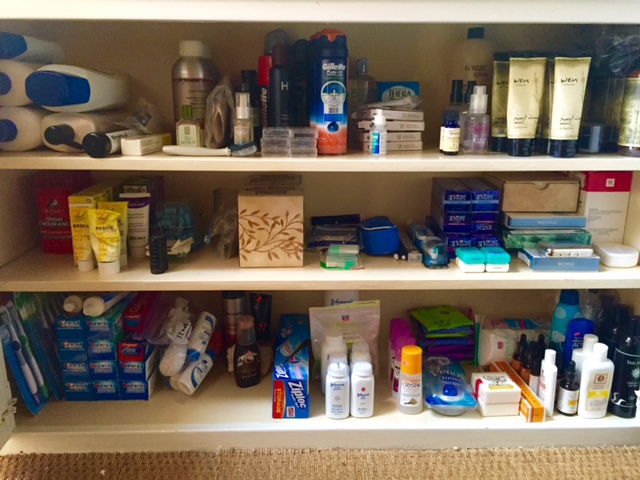Yes! Clean out that storage closet once and for all. I just helped a client do this, and I want to share a few things that might be useful for the closet you have been ignoring... and the skeletons inside.
My client had recently moved, and didn't have time to purge or organize before transitioning from old place to new. As a result, her storage closet was riddled with random items (because it had a door to close and hide it all behind). Sound familiar? Well, it happens all the time. Time to reclaim your space!
To get started, take everything out of the closet. As you remove items, sort them into piles with similar types of items - put like items with like items.
With my client, as with most clients, the piles looked something like this: the first pile was composed of packing supplies, including empty boxes, bubble wrap, tubes for posters, etc. A second pile contained decor items that worked in her old place but didn't work in her new home, including items that needed to be returned. Off to the side, we had a pile of stuff that was to be sold on eBay and Craigslist, and finally, my favorite pile, the bag of bags. Over 90% of my clients have at least one of these piles:)
We also had piles of old makeup to go through, bedding to make decisions on, and office supplies to sort. However, the 4 piles I want to focus on are the four piles mentioned above: packing supplies, things that aren't working, stuff to sell, and the bag of bags. By just dealing with the items in these four piles, you will reduce clutter by half. So, in no particular order, give yourself permission to let go of ---
1 - Items that are not working in the new (or current) space. This is often a frustrating endeavor, but it's time to realize that even alternative facts won't make your drawer organizers from your last residence fit your new space, and those pictures that looked great on your former living room wall don't catch the light in the same way in your new (or now) house. Yet, these items get tucked away in the storage closet in hopes you will find someone to give it to or eventually sell it. A big crutch in the letting go process is the "waiting to give it to someone who will need it" crutch. We always want to help someone out (or in some cases, pass the obligation of the item onto someone else), but then the unwanted item ends up chewing up valuable real estate in your space for way too long. So go ahead, give yourself permission. Donate it. And those things that need to be returned that didn't work for the new space that got shoved in the storage closet to collect dust and be forgotten? Put them in your car with the receipt and make sure it gets returned before it's too late. Or donate them.
2 - The eBay and Craigslist pile. My client had fancy and pricey dresses; some still had the tags on them, plus other items she thought could be worth selling. Of course, I'm all for donating it. Too often the ideal amount you think you can get for a given item is a lot more then what you can actually get for it. With my client, we started looking up how much similar dresses were selling for online and found that they were going for $20 or $30, and some were being stolen at $10. So I ask, how much is your time worth? $10/hr? $20/hr? Because the time you use listing the item, the time spent in sale limbo/haggling with a stranger, the time and energy physically exerted in shipping the item... is the sale really worth the trouble and your time? I suggest establishing a minimum listing item price of $50 or more to make the listing worthy of your time. If you can get at least $50 for an item, then list it. If not, donate it.
3 - The pile of packing supplies. It will be easier to let these items go when you realize you are donating most of the stuff you thought you were going to sell. The act of breaking down empty boxes from deliveries alone (ahem...amazon) will reclaim a significant amount of space.
4 - The bag of bags, or should I say the whole closet, considering how they seem to fill up space like some magic growing jello. Like many people, my client was keeping every bag that was ever given to her, and all the ones she paid for like the ones from Ikea, etc. We looked through them all, and kept a select few that were in good shape. We used some to bag donation items, and, get ready, donated the rest.
How many shopping bags does one household need? If you go shopping and use about 5 recycled bags, then keep that amount in your car, and get rid of the remainder. Rest assured, more reusable bags will come into your life; someone is always giving away a free bag. Oh! And if you get paper and plastic bags every time you go to the grocer's and keep them for trash, then take one bag and fill it up with other bags; whatever doesn't fit in that one bag, you recycle. You will keep getting more every time you go shopping; have faith that you will not run out.
By focusing on items in these 4 piles, and not worrying about the organizing part yet, we saw a huge difference in reclaimed closet space. My client even had drawers in the closet that (I didn't know she had) she could never get to, now ready to be filled with items worthy of storing.
So, what can you donate today to win back your storage closet?





